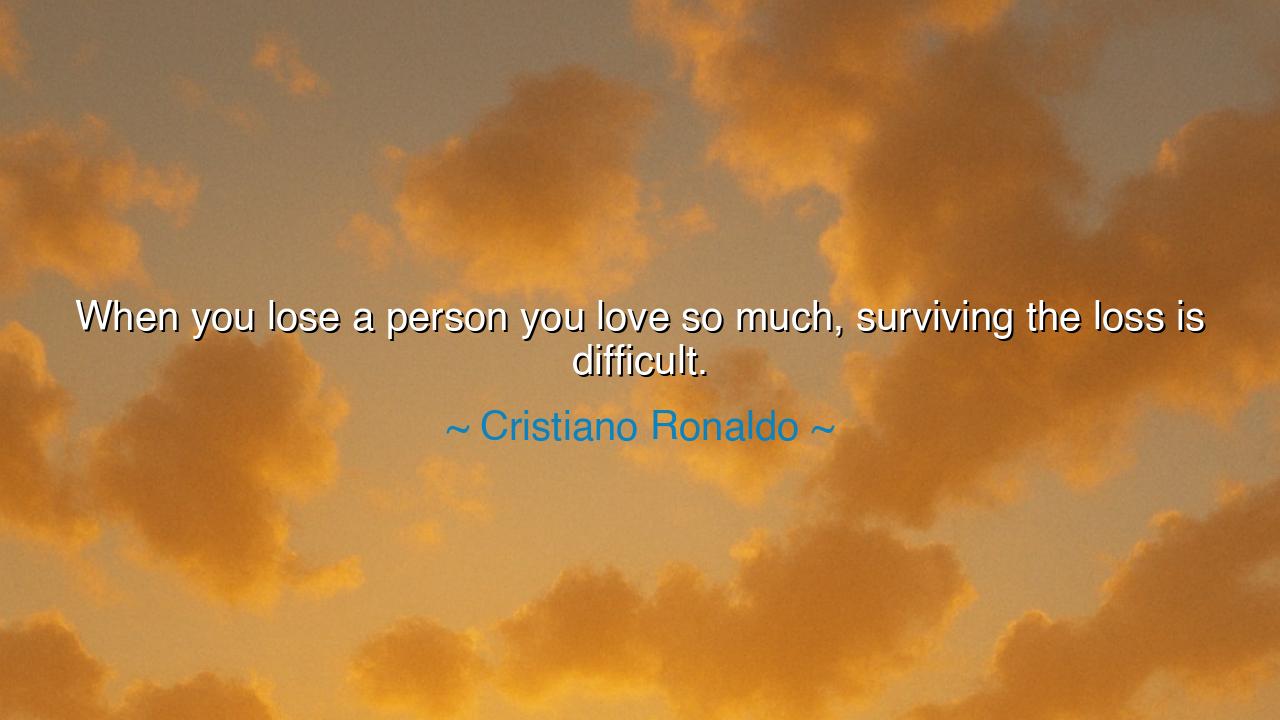
When you lose a person you love so much, surviving the loss is






“When you lose a person you love so much, surviving the loss is difficult.” Thus spoke Cristiano Ronaldo, a man celebrated across the world for his strength, his glory, and his triumphs — yet in this single sentence, he reveals the truth that humbles even the mightiest: that grief spares no one, not even heroes. Behind the roar of stadiums and the brilliance of trophies, he gives voice to the ancient sorrow that has shadowed humankind since its dawn — the ache of losing someone whose love had become the light of our existence. In this confession, Ronaldo becomes not a star of sport, but a witness of the soul, speaking for all who have ever stood before the silence left by loss.
To understand his words, we must remember the depth of love he speaks of. It is not the casual affection that flickers and fades, but the love that binds souls — between parent and child, between partners, between those whose lives have become one melody. When such a love is torn away, the world itself seems to shatter. The heart, once full, becomes a vessel of absence. This is what Ronaldo means when he says that surviving becomes difficult. For when love dies or departs, it is not only the loved one who is gone — it is a part of ourselves that is buried with them. We are left to wander through the ruins of our own hearts, seeking fragments of meaning in the emptiness.
The ancients understood this pain well. In the story of Orpheus and Eurydice, the poet Orpheus descends into the underworld itself to reclaim his beloved from death. With his lyre, he softens the hearts of the gods and wins her release — but his faith falters for a moment, and she is lost to him forever. This myth endures because it mirrors the truth that Ronaldo names: that love and loss are inseparable, and that even the greatest courage cannot always undo fate. To love deeply is to risk the agony of losing, and yet, to refuse love for fear of grief is to refuse the essence of life itself.
Ronaldo’s own life, too, bears the weight of these words. Known for his strength and resilience, he has faced personal loss with quiet pain — most poignantly, the loss of his newborn son. In those moments, the grandeur of fame fades, and what remains is the universal ache of a father’s heart. His quote is not born of abstraction, but of experience. He has known the loneliness of mourning in the midst of adoration, the strange dissonance between public triumph and private sorrow. When he says surviving the loss is difficult, it is both a confession and a truth — that strength is not the absence of pain, but the endurance to continue despite it.
Grief, when it comes, is both cruel and sacred. It reminds us that love was real, that our hearts were capable of greatness. The pain of loss is the shadow cast by the light of affection. As the philosopher Kahlil Gibran once wrote, “The deeper that sorrow carves into your being, the more joy you can contain.” To suffer the loss of someone you love so much is to bear witness to your capacity for love — to have known something so beautiful that its absence wounds you. And so, grief, though it feels like death, is in truth the proof of life — the measure of how deeply we have dared to care.
And yet, though survival is hard, it is not impossible. The ancients taught that time does not erase pain, but it transforms it. What once was sharp becomes sacred; what once was unbearable becomes a memory we can hold without breaking. Ronaldo’s words, though sorrowful, contain this quiet strength — that surviving grief is not about forgetting, but about learning to live with love in a new form. Those we lose do not vanish; they become part of us, living within the actions, choices, and compassion they inspired. Love does not die — it changes its shape.
So, my child, when you find yourself in the valley of loss, remember this: your sorrow is the price of having loved well. Do not rush to escape it. Let it wash through you like a storm, for when it passes, it will leave your soul cleansed and deeper than before. Speak the names of those you’ve lost, honor their memory with kindness, and let the love that remains within you move outward — to heal others as you were once healed. For though surviving the loss is difficult, love itself is eternal. It lives on in every act of courage, every gentle word, every heartbeat that chooses to endure.
And when the pain feels too heavy to bear, look to the sky, as Ronaldo must have done in his moments of silence, and know that your grief is not your weakness — it is your strength. For to have loved so deeply that its loss wounds you is to have touched something divine. And though the world may never be the same again, remember this truth: what love once gave, death cannot destroy.






AAdministratorAdministrator
Welcome, honored guests. Please leave a comment, we will respond soon